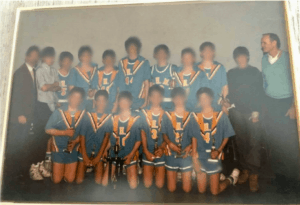A New York State judge overseeing the civil trial against a former Immaculate Heart of Mary teacher will force the Roman Catholic Archdiocese of New York to hand over documents pertaining to a 2002 grand jury investigation about the church’s role in the sexual abuse of minors, court documents reveal.
On May 5, state Associate Supreme Court Justice Steven M. Jaeger denied efforts by the Archdiocese—which is listed as a co-defendant alongside Edwin Gaynor, a former school employee who has been accused of sexual abuse—to withhold information relating to the 2002 investigation, ruling that those documents could be relevant to the current cases being brought forth against the former teacher and coach.

Counsel for the plaintiffs first requested, in September 2020, that all grand jury documents regarding the 2002 investigation be made available during discovery. The gambit was opposed by Archdiocesan attorneys in an Oct. 28, 2020, motion which labeled these requests as “overly-broad.”
Since November 2019, more than 30 accusers have come forward with claims against Gaynor, alleging that the 85-year-old Ossining resident used his position as a teacher and employee of catholic schools in Westchester County—notably IHM in Scarsdale and Holy Rosary in Hawthorne—to abuse minors from the late 1950s to mid-1980s.
In his ruling, Jaeger pointed to the plaintiffs’ allegations that church officials had knowingly dismissed complaints against Gaynor and continued to employ him, a practice detailed in the testimony from the 2002 investigation.
The 2002 grand jury was convened by then-Westchester County District Attorney Jeanine Pirro, a Republican, following bombshell reporting by the Boston Globe that uncovered a pattern of systemic sexual abuse that had been covered up for decades by the Boston Archdiocese. Meeting 15 times and calling 21 witnesses, the grand jury released its report on June 18 of that year, finding that the New York Archdiocese had indeed failed to report claims of abuse in Westchester County and proposing legislative recommendations—including abolishing the statute of limitations for sex crimes against minors—that would make it easier for alleged victims to come forward in the future.
“The objection to release by the Archdiocese of the documents submitted to the Westchester County 2002 Grand Jury Report is misplaced as it is alleged to deal with Archdiocese’s alleged malfeasance . . . and for the conduct of the same clergy and employees,” Jaeger wrote. “Such documents may be probative of its negligence and its knowledge of Gaynor’s conduct.”
Barbara Hart, an attorney at Grant & Eisenhofer P.A., which represents more than 20 of Gaynor’s accusers, said that the judge’s ruling is a positive sign for her clients and believes that even if the documents do not shed any new light on Gaynor’s alleged behavior, they may be able to establish a pattern of allegations against clergy members and laypeople employed by the Archdiocese being swept under the rug.
Between 1959 and 1986, Gaynor was employed by or connected to at least three parishes in Westchester and ran youth sports leagues for their catholic schools, even after complaints about his behavior had reportedly been made to senior church officials.
“We’re glad that the court is going to hold the Archdiocese to its obligations,” Hart said. “There’s a consistent pattern of moving pedophiles around and we are trying to establish negligence in that they knew when they moved someone, they would often come out and do it again.”
On May 12, attorneys representing the Archdiocese filed an appeal of Jaeger’s ruling, something Hart maintains is in lockstep with their tactics thus far.
“It’s consistent with their avoidance of discovery,” she said. “They’re unresponsive, trying to run out the clock and then they’re going to argue the passage of time, failing memories and not having evidence.”
Contact: sports@hometwn.com








